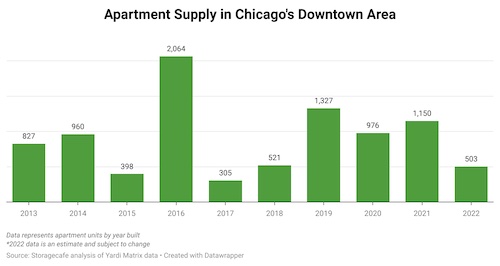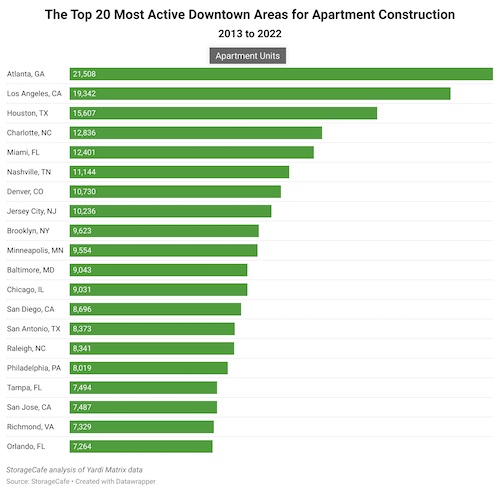
A variety of unprecedented events over the last few years have impacted markets around the world. There have been growing concerns about inflation across the commercial real estate sector, but the overall economic outlook is positive. However, one element that still worries industry participants is the rise and uncertainty of interest rates. It should be no surprise that inflation has increased as a result of supply chain disruption, manufacturing slowdowns, unanticipated spikes in demand, and the U.S. Federal Reserve pumping money into the economy in an attempt to alleviate these market issues that arose from events like the global pandemic. Overall, rising interest rates have been used as a tool to stifle demand, in the hopes that slowing it down will also slow price escalation.
Manufacturing And Real Estate Amid Economic Uncertainty
At the start of the pandemic, manufacturing and production slowed significantly or shut down as organizations prepared for consumers to cut spending. Surprisingly, demand skyrocketed—but with production scaled back and factories shut down due to Covid-19, it proved difficult to meet the growing need for goods. The pandemic also drove major changes in consumer behavior, including online shopping, remote working, and migration, predominantly to warmer cities and sunbelt markets. All these changes have led to unpredictable shifts in business demand for commercial space, occupancy rates, earnings for commercial real estate and property valuations.
Additionally, the demand for new semiconductor chip plants, battery manufacturing plants, data centers, and electric car manufacturing plants has put incredible pressure on supply resulting in meaningful inflation, material delays, and supply chain disruptions. Capacity restrictions could potentially be stopped or alleviated by central banks. There are long- and short-term ways to impact this, such as reducing quantitative easing, selling bonds, and raising interest rates. This directly affects real estate because when buyers have a higher cost of debt, they are less willing to pay for assets to deliver the same yield or investment returns. In the near term, the rising cost of debt and uncertainty around its availability can make it difficult to underwrite new developments or acquisitions. However, high-barrier-to-entry markets with limited supply or investments with long-term horizons are both still very achievable to finance today.
Rising Rates And Real Estate
The American people’s investment patterns during turbulent times directly impact our economy. Although the market and rates are currently rebounding, public concern makes sense when considering the initial data. The U.S. Labor Department reported that the consumer-price index rose 8.3% for the 12 months ending in August—but this is a smaller figure than the 8.5% increase over the 12-month-period ending in July. Consumers need to note that rates are improving and easing from the unprecedented spikes seen earlier this year.
Insight from Axios and analysts (subscription required) highlights that the public’s general perception and fear could actually seal an economy into a recession. Regardless of the statistical odds of a recession occurring, if the public is wary about opening their wallets, especially in capitalistic markets powered by consumer spending, a recession could become a self-fulfilling prophecy. Public behavior could also cause inflation in a similar way: If individuals and businesses believe the cost of buying goods today will be less expensive than in the future, buying extra goods will inherently drive higher inflation by adding extra demand to an already supply-strained economy.
The Fed has used interest rate hikes to give consumers confidence that inflation will remain in check. But under these circumstances, it has become more difficult to finance new real estate projects or acquire existing assets, leaving buyers unable to predict their cost of debt and developers unable to gauge exit valuation rates when underwriting deals.
This has also brought a steep increase in mortgage rates, causing homeowners to pay higher prices, resulting in an influx of renters and buyers reconsidering deals until prices return to being affordable. It makes sense both that buyers are increasingly rejecting record home prices, while sellers are unwilling to accept a lower price than values achieved only months earlier.
As someone who frequently engages with commercial real estate investors, it’s been interesting to see how many investors have shifted their focus toward build-to-rent and single-family homes. Build-to-rent communities, in particular, offer many of the amenities and luxuries that buyers today seek. I expect that these two areas should do increasingly well in this market as we wait for prices to stabilize.
A Bright Future
Data shows that younger generations have the most positive outlook on their financial futures, with
70% of millennials and 66% of Gen-Z feeling confident versus only 39% of Baby Boomers. The reason for this disparity could be that, historically, the stock market goes up over time, but during this stock dip, those going into retirement are being demoralized by the prospect of seeing their life savings and retirement wiped away.
According to Mortage News Daily’s analyses,
current 30-year fixed mortgage rates still show signs of opportunity. People are searching for space to build connections, families, and their dream homes—especially after the pandemic. The valuations of critical real estate assets and stock prices of businesses that are profitable should remain stable and are poised for growth in the future. Predictions are showing the market outlook to be favorable given GDP growth, limited supply of assets, credit availability, and promising forecasts for the real estate industry. This is a time when young investors with ample time and opportunities should capitalize on the market—not run away from it.
Source: A CRE Executive’s Outlook On Market Optimism
https://www.creconsult.net/market-trends/a-cre-executives-outlook-on-market-optimism/








 A variety of unprecedented events over the last few years have impacted markets around the world. There have been growing concerns about inflation across the commercial real estate sector, but the overall economic outlook is positive. However, one element that still worries industry participants is the rise and uncertainty of interest rates. It should be no surprise that inflation has increased as a result of supply chain disruption, manufacturing slowdowns, unanticipated spikes in demand, and the U.S. Federal Reserve pumping money into the economy in an attempt to alleviate these market issues that arose from events like the global pandemic. Overall, rising interest rates have been used as a tool to stifle demand, in the hopes that slowing it down will also slow price escalation.
Manufacturing And Real Estate Amid Economic Uncertainty
At the start of the pandemic, manufacturing and production slowed significantly or shut down as organizations prepared for consumers to cut spending. Surprisingly, demand skyrocketed—but with production scaled back and factories shut down due to Covid-19, it proved difficult to meet the growing need for goods. The pandemic also drove major changes in consumer behavior, including online shopping, remote working, and migration, predominantly to warmer cities and sunbelt markets. All these changes have led to unpredictable shifts in business demand for commercial space, occupancy rates, earnings for commercial real estate and property valuations.
Additionally, the demand for new semiconductor chip plants, battery manufacturing plants, data centers, and electric car manufacturing plants has put incredible pressure on supply resulting in meaningful inflation, material delays, and supply chain disruptions. Capacity restrictions could potentially be stopped or alleviated by central banks. There are long- and short-term ways to impact this, such as reducing quantitative easing, selling bonds, and raising interest rates. This directly affects real estate because when buyers have a higher cost of debt, they are less willing to pay for assets to deliver the same yield or investment returns. In the near term, the rising cost of debt and uncertainty around its availability can make it difficult to underwrite new developments or acquisitions. However, high-barrier-to-entry markets with limited supply or investments with long-term horizons are both still very achievable to finance today.
Rising Rates And Real Estate
The American people’s investment patterns during turbulent times directly impact our economy. Although the market and rates are currently rebounding, public concern makes sense when considering the initial data. The U.S. Labor Department reported that the consumer-price index rose 8.3% for the 12 months ending in August—but this is a smaller figure than the 8.5% increase over the 12-month-period ending in July. Consumers need to note that rates are improving and easing from the unprecedented spikes seen earlier this year.
Insight from Axios and analysts (subscription required) highlights that the public’s general perception and fear could actually seal an economy into a recession. Regardless of the statistical odds of a recession occurring, if the public is wary about opening their wallets, especially in capitalistic markets powered by consumer spending, a recession could become a self-fulfilling prophecy. Public behavior could also cause inflation in a similar way: If individuals and businesses believe the cost of buying goods today will be less expensive than in the future, buying extra goods will inherently drive higher inflation by adding extra demand to an already supply-strained economy.
The Fed has used interest rate hikes to give consumers confidence that inflation will remain in check. But under these circumstances, it has become more difficult to finance new real estate projects or acquire existing assets, leaving buyers unable to predict their cost of debt and developers unable to gauge exit valuation rates when underwriting deals.
This has also brought a steep increase in mortgage rates, causing homeowners to pay higher prices, resulting in an influx of renters and buyers reconsidering deals until prices return to being affordable. It makes sense both that buyers are increasingly rejecting record home prices, while sellers are unwilling to accept a lower price than values achieved only months earlier.
As someone who frequently engages with commercial real estate investors, it’s been interesting to see how many investors have shifted their focus toward build-to-rent and single-family homes. Build-to-rent communities, in particular, offer many of the amenities and luxuries that buyers today seek. I expect that these two areas should do increasingly well in this market as we wait for prices to stabilize.
A Bright Future
Data shows that younger generations have the most positive outlook on their financial futures, with
A variety of unprecedented events over the last few years have impacted markets around the world. There have been growing concerns about inflation across the commercial real estate sector, but the overall economic outlook is positive. However, one element that still worries industry participants is the rise and uncertainty of interest rates. It should be no surprise that inflation has increased as a result of supply chain disruption, manufacturing slowdowns, unanticipated spikes in demand, and the U.S. Federal Reserve pumping money into the economy in an attempt to alleviate these market issues that arose from events like the global pandemic. Overall, rising interest rates have been used as a tool to stifle demand, in the hopes that slowing it down will also slow price escalation.
Manufacturing And Real Estate Amid Economic Uncertainty
At the start of the pandemic, manufacturing and production slowed significantly or shut down as organizations prepared for consumers to cut spending. Surprisingly, demand skyrocketed—but with production scaled back and factories shut down due to Covid-19, it proved difficult to meet the growing need for goods. The pandemic also drove major changes in consumer behavior, including online shopping, remote working, and migration, predominantly to warmer cities and sunbelt markets. All these changes have led to unpredictable shifts in business demand for commercial space, occupancy rates, earnings for commercial real estate and property valuations.
Additionally, the demand for new semiconductor chip plants, battery manufacturing plants, data centers, and electric car manufacturing plants has put incredible pressure on supply resulting in meaningful inflation, material delays, and supply chain disruptions. Capacity restrictions could potentially be stopped or alleviated by central banks. There are long- and short-term ways to impact this, such as reducing quantitative easing, selling bonds, and raising interest rates. This directly affects real estate because when buyers have a higher cost of debt, they are less willing to pay for assets to deliver the same yield or investment returns. In the near term, the rising cost of debt and uncertainty around its availability can make it difficult to underwrite new developments or acquisitions. However, high-barrier-to-entry markets with limited supply or investments with long-term horizons are both still very achievable to finance today.
Rising Rates And Real Estate
The American people’s investment patterns during turbulent times directly impact our economy. Although the market and rates are currently rebounding, public concern makes sense when considering the initial data. The U.S. Labor Department reported that the consumer-price index rose 8.3% for the 12 months ending in August—but this is a smaller figure than the 8.5% increase over the 12-month-period ending in July. Consumers need to note that rates are improving and easing from the unprecedented spikes seen earlier this year.
Insight from Axios and analysts (subscription required) highlights that the public’s general perception and fear could actually seal an economy into a recession. Regardless of the statistical odds of a recession occurring, if the public is wary about opening their wallets, especially in capitalistic markets powered by consumer spending, a recession could become a self-fulfilling prophecy. Public behavior could also cause inflation in a similar way: If individuals and businesses believe the cost of buying goods today will be less expensive than in the future, buying extra goods will inherently drive higher inflation by adding extra demand to an already supply-strained economy.
The Fed has used interest rate hikes to give consumers confidence that inflation will remain in check. But under these circumstances, it has become more difficult to finance new real estate projects or acquire existing assets, leaving buyers unable to predict their cost of debt and developers unable to gauge exit valuation rates when underwriting deals.
This has also brought a steep increase in mortgage rates, causing homeowners to pay higher prices, resulting in an influx of renters and buyers reconsidering deals until prices return to being affordable. It makes sense both that buyers are increasingly rejecting record home prices, while sellers are unwilling to accept a lower price than values achieved only months earlier.
As someone who frequently engages with commercial real estate investors, it’s been interesting to see how many investors have shifted their focus toward build-to-rent and single-family homes. Build-to-rent communities, in particular, offer many of the amenities and luxuries that buyers today seek. I expect that these two areas should do increasingly well in this market as we wait for prices to stabilize.
A Bright Future
Data shows that younger generations have the most positive outlook on their financial futures, with